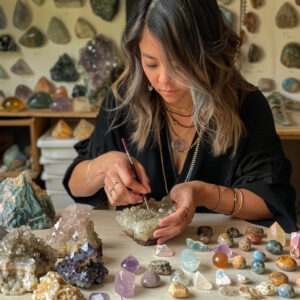At a Glance
- However, a lesser-known aspect of hematite is its susceptibility to rusting, a fascinating process that unveils the intricate interplay between iron, oxygen, and water.
- Rust, a ubiquitous sight in our surroundings, is the result of iron’s reaction with oxygen in the presence of water or moisture.
- This process is accelerated in environments with high humidity or direct contact with water, leading to the transformation of hematite’s characteristic red-brown color to a rusty orange or brown.
Hematite, a prevalent iron oxide mineral, is renowned for its captivating red-brown hue, often employed as a pigment in paints and cosmetics. However, a lesser-known aspect of hematite is its susceptibility to rusting, a fascinating process that unveils the intricate interplay between iron, oxygen, and water. In this comprehensive exploration, we delve into the intriguing question: “Will hematite stone rust?” Unraveling the factors that influence rust formation, we uncover the mechanisms behind this natural phenomenon.
Understanding Rust and Its Significance:
Rust, a ubiquitous sight in our surroundings, is the result of iron’s reaction with oxygen in the presence of water or moisture. This process, known as oxidation, leads to the formation of iron oxides, characterized by their reddish-brown appearance. Rusting is a natural process that affects various iron-containing materials, including hematite, causing them to deteriorate over time.
Rusting of Hematite: A Closer Look:
Hematite, composed primarily of iron oxide, is inherently prone to rusting. When exposed to moisture and oxygen, the iron atoms within hematite undergo oxidation, resulting in the formation of rust. This process is accelerated in environments with high humidity or direct contact with water, leading to the transformation of hematite’s characteristic red-brown color to a rusty orange or brown.
Factors Influencing Rust Formation:
The rusting of hematite is influenced by several factors, including:
- Moisture: The presence of moisture or water is essential for rust formation. Hematite exposed to humid environments or direct contact with water is more susceptible to rusting.
- Oxygen: Rusting requires the presence of oxygen. Hematite exposed to oxygen-rich environments, such as the Earth’s atmosphere, is more prone to rusting.
- Temperature: Higher temperatures can accelerate the rusting process. This is because elevated temperatures increase the rate of chemical reactions, including the oxidation of iron.
Rusting and Hematite’s Properties:
Rusting can significantly alter the properties of hematite, affecting its appearance, strength, and stability.
- Color: Hematite’s characteristic red-brown color undergoes a transformation during rusting, shifting to a rusty orange or brown hue.
- Strength: Rusting weakens hematite, making it more brittle and susceptible to crumbling or breaking.
- Stability: Rusting compromises the stability of hematite, accelerating its decomposition and deterioration over time.
Applications of Hematite: Beyond Rusting:
Despite its susceptibility to rusting, hematite finds diverse applications in various industries:
- Pigments: Hematite’s natural red-brown color makes it a valuable pigment in paints, cosmetics, and pottery.
- Iron Ore: Hematite is a primary source of iron ore, used in the production of steel and other iron-based materials.
- Jewelry: Hematite is sometimes used in jewelry making, prized for its unique appearance and metaphysical properties.
Minimizing Rust Formation: Protective Measures:
While rusting is a natural process, certain measures can be taken to minimize its impact on hematite:
- Coating: Applying protective coatings, such as paint or sealant, can prevent direct contact between hematite and moisture or oxygen, reducing the risk of rust formation.
- Storage: Storing hematite in dry, moisture-free environments can help prevent rusting.
- Regular Maintenance: Regularly inspecting hematite for signs of rust and taking prompt action to remove rust can help preserve its integrity and longevity.
The Bottom Line: Rusting Hematite – A Complex Phenomenon:
The rusting of hematite is a complex phenomenon influenced by various factors, including moisture, oxygen, temperature, and the inherent properties of hematite itself. While rusting can alter hematite‘s appearance, strength, and stability, it also highlights the dynamic nature of geological processes and the intricate interplay between elements in our environment. Understanding the mechanisms behind rust formation allows us to appreciate the beauty of natural transformations and the significance of preserving our mineral resources.
What You Need to Know
Q1. Can hematite rust underwater?
A1. Yes, hematite can rust underwater if exposed to dissolved oxygen. The presence of water accelerates the rusting process, leading to the formation of hydrated iron oxides.
Q2. How can I identify rust on hematite?
A2. Rust on hematite is typically visible as a reddish-orange or brown discoloration on the mineral’s surface. It may also appear as a powdery substance or flakes that can be easily removed.
Q3. Is rusting harmful to hematite?
A3. Rusting can weaken hematite, making it more brittle and susceptible to crumbling or breaking. It can also affect the mineral’s appearance and stability, potentially reducing its value and usefulness.
Q4. Can I remove rust from hematite?
A4. Yes, it is possible to remove rust from hematite using various methods, such as chemical treatments, mechanical abrasion, or electrolytic processes. The specific method depends on the extent of rusting and the desired results.
Q5. How can I prevent hematite from rusting?
A5. To prevent hematite from rusting, it is essential to minimize its exposure to moisture and oxygen. Applying protective coatings, storing hematite in dry environments, and regularly inspecting for signs of rust can help preserve its integrity and longevity.
